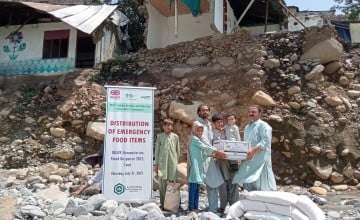
Read our 2024 annual report

Knowledge Hub
Devastating cloud bursts in Pakistan: Concern’s response to monsoon flood
Relentless monsoon rains and cloudbursts have unleashed flash floods and landslides across Pakistan.

Since June, relentless monsoon rains have unleashed flash floods and landslides across Pakistan, claiming over 650 lives, according to the National Disaster Management Agency. The devastation doesn't stop there; nearly a thousand people have been injured, and the damage to infrastructure is extensive.
The Province of Khyber Pakhtunkhwa has borne the brunt of this disaster, recording the highest number of fatalities and the most severe infrastructure damage. Buner District, in particular, has been hit hardest, with over 213 deaths due to the worst flash flood. Search and rescue operations are underway, and the number of casualties is expected to rise. The government has declared Buner and other severely affected districts as calamity-hit areas and has issued an urgent appeal for humanitarian assistance.
Cloudbursts and climate change
It’s been reported that Buner District was hit by a cloudburst, which is a rare phenomenon resulting in a sudden and violent downpour, when more than 10cm of rain falls within an hour over a localized area of about 30 square kilometres. Imagine a rain bomb exploding, releasing several hours' worth of normal rainfall in an instant. This sudden deluge can trigger deadly floods, overwhelming the land with too much water too quickly. They occur when warm, moist air rises rapidly and condenses into heavy rain clouds. Mountainous regions are particularly susceptible, as the air is forced to rise upon encountering hills or mountains, cooling and condensing into heavy rain clouds. These natural barriers trap the clouds, preventing them from dispersing.
As a mountainous country prone to to monsoons and heavy moisture, Pakistan is particularly vulnerable to climate change and extreme weather events such as these. Rising temperatures exacerbate the situation, as warmer air masses can hold more moisture, creating ideal conditions for sudden and intense downpours.
This is not the first time that Pakistan has been devastated by flooding. The 2022 monsoon season was the worst on record, resulting in over 1,700 deaths, displacing more than 2 million people, and affecting 33 million people in total. Similarly, in 2010, floods wreaked havoc across one-fifth of the country's total land mass, impacting around 20 million people and causing widespread destruction to property, infrastructure, and livelihoods.
Concern’s Response
Our team in Pakistan, along with partners, are actively responding to the call for assistance in seven of the affected districts, including Buner. The response focuses on immediate relief and early recovery support. This includes distributing food, hygiene kits, kitchen sets, and other essential household items. We are also rehabilitating infrastructure such as bridges, water points, and latrines, and providing livelihood support like small business restoration, fodder for livestock, and crop inputs for farmers. Additionally, we are implementing irrigation activities and other flood mitigation measures.
This year’s monsoon season started earlier than usual and will end late, around mid-September, with forecasts predicting intense monsoon rains in the next 15 days. More areas are expected to be affected, with a heightened risk of flooding in the densely populated Punjab and Sindh provinces. Concern is closely monitoring the situation, and with our partners, are ready to initiate rapid needs assessments in any newly affected areas.
Our impact in 2024
people reached through our emergency response
people reached through our health interventions
people reached through our livelihoods programmes


